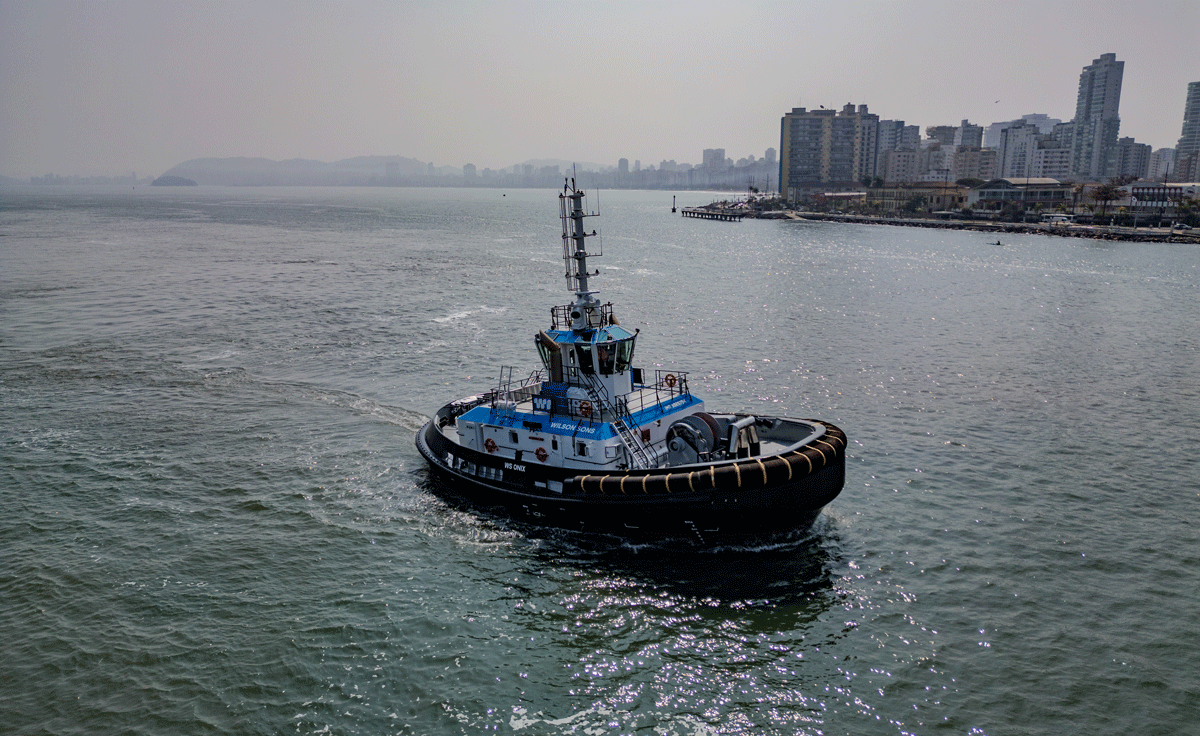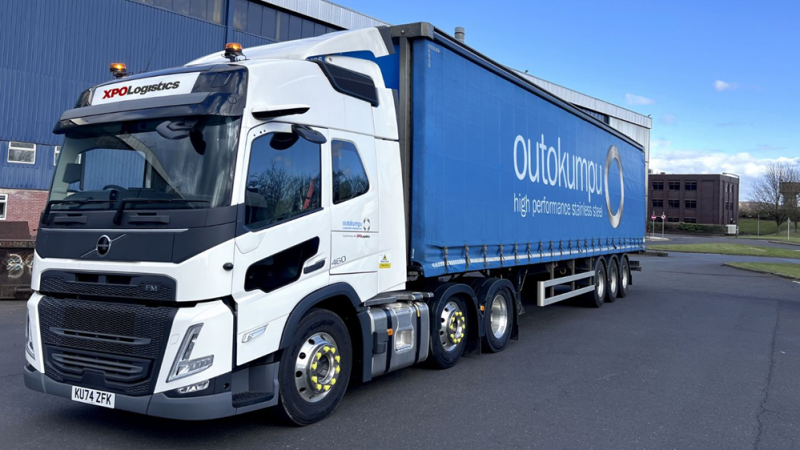Wilson Sons: tugboat WS Onix, powered by cutting-edge technology, in the Port of Santos
Wilson Sons, a leader in port and maritime logistics in Brazil, has started operations with WS Onix, in the Port of Santos, the largest port facility in Latin America. Baptized in August, it is the sixth in the 2513 class, with more sustainable technology and great power, built at the company’s shipyard in Guarujá (SP). The six new tugs built over the last two years have completed more than 5,000 port manoeuvres, supporting the development of local economy and Brazilian foreign trade.
New tugs: more sustainable technology
The company increased the power of its fleet of 80+ tugboats, which operate along the Brazilian coast, adding efficiency to the berthing and unberthing of large ships that are now operating in Brazil, such as 366-metre New Panamax ships, and conduct special offshore activities. The new tugs are equipped with over 90 tons of bollard pull and are the first ever in Brazil to follow the IMO TIER III standard established by the International Maritime Organization, which attests to the reduction of up to 70% of nitrogen oxide. This standard is only required in emission-controlled areas, such as in some regions of North America and Europe.
Their innovative Damen Shipyards hull design leads to reduced greenhouse gas emissions and an estimated decrease of 14% in the consumption of fossil fuels, supporting the improvement of air quality in the ports where they operate. The twin fins improve seaworthiness and increase drag capacity in manoeuvres, which ensures smaller fuel consumption and, consequently, lower emissions. The tugs are 25 metres long and 13 metres wide, operate forward and aft with the same efficiency, and can be used in port manoeuvres and deep-sea towage.
Operations in Brazilian ports and terminals
Financed by the Merchant Navy Fund (FMM) and using BNDES as a lending institution, six new tugs have been built, with the first one — WS Centaurus — being delivered in July 2022. WS Centaurus has been operating at the Ponta da Madeira, Itaqui and Alumar terminals in São Luís (state of Maranhão), attending large ships exporting up to 400,000 tons of cargo. At Ponta da Madeira, it supports iron ore ships. At Itaqui, it conducts operations on ships carrying diesel, corn, soybean, fertiliser and paper pulp.
Subsequently, WS Orion — which joined WS Centaurus in operations in the same area — was delivered. Then, WS Rosalvo (which operates in the Port of Açu, in São João da Barra — RJ, supporting the mining and energy industries), WS Castor (which has recently started operating in the Port of Açu), and WS Dorado, which also operates in the port facility of São Luís, in Maranhão. And, at the beginning of the second half of the year, WS Onix was completed.
“With advanced hydrodynamics and cutting-edge technology, these tugboats are the most powerful tugs operating in the country, representing a milestone for the industry. Capable of meeting our clients’ increasingly larger ships with superior safety and efficiency standards, these tugs have proven that technology and innovation are great allies in improving port operations, enhancing maritime infrastructure and supporting Brazil’s development,” says Márcio Castro, executive director of Wilson Sons’ Towage division.
Positive impacts on ports and terminals
As six new tugs enter into operation, the ports where Wilson Sons works have been positively impacted. A case in point is WS Dorado, which came to enhance the fleet allocated to port facilities in São Luís do Maranhão, and added further power and onboard technology to three other ports in Brazil: Salvador (BA), Belém (PA), and Cabedelo (PB).
Every time the company receives a new tugboat from its shipyard, an old one is replaced. This improves the efficiency of port operations at the destination port and ensures that the latest technologies and innovations are available to serve customers. “In general, newer tugboats are more powerful, fuel-efficient and have more advanced safety equipment, which improves the port’s capabilities,” explains Rodrigo Bastos, Operations director of Wilson Sons’ Towage division.
The replaced tug, in turn, is relocated to another port to add to the existing fleet. This relocation process creates a cascading effect, benefiting multiple locations. The ports receiving these relocated tugs have increased manoeuvrability and service capabilities, allowing a speedier and safer flow of ships and cargo. This is particularly important for smaller or less busy ports, where increasing the fleet makes a substantial difference in operational efficiency.
The company’s shipyard has built 154 vessels
With the delivery of WS Onix, the company amasses 154 vessels built in its shipyard. Its 80+ tugs operate along the Brazilian coastline, and are present in more than 40% of all berthing manoeuvres in Brazil. The company makes a positive impact on society and industries around the world, allowing the flow of international trade to take place with safety, sustainability and operational efficiency.
“The six new tugboats with cutting-edge technology, completed with WS Onix, generates value for all our stakeholders, representing an important step in shipbuilding and in the progress of our industry,” says Adalberto Souza, executive director of Wilson Sons’ Shipyard division.
About Wilson Sons
Wilson Sons is the largest port-shipping logistics operator in Brazil, with over 186 years of experience. The company operates across Brazil and offers complete solutions to more than 5,000 clients, including shipowners, importers and exporters, offshore energy industry, renewable energy projects, agribusiness corporations, and other players in different businesses.
Learn more by clicking here.







